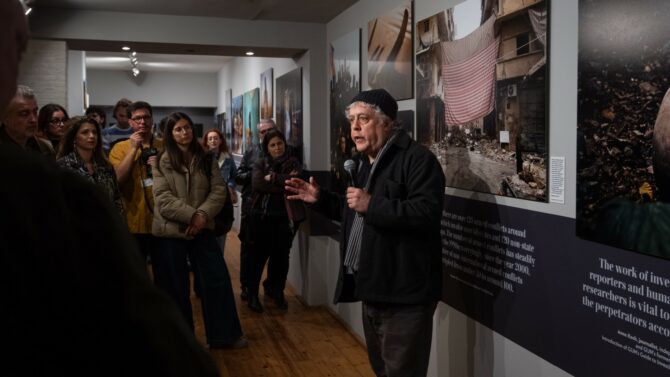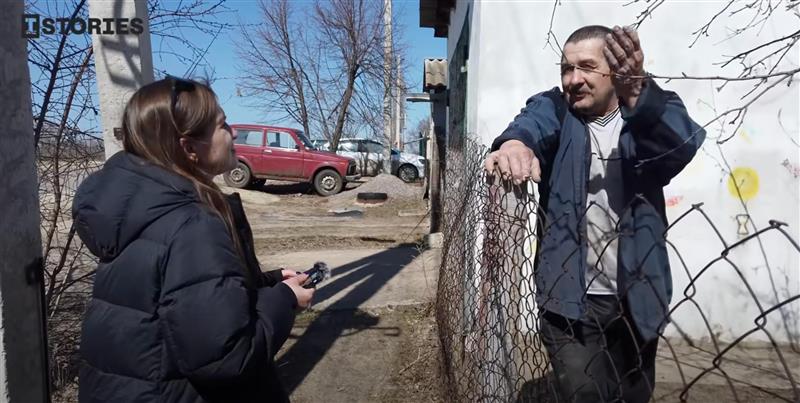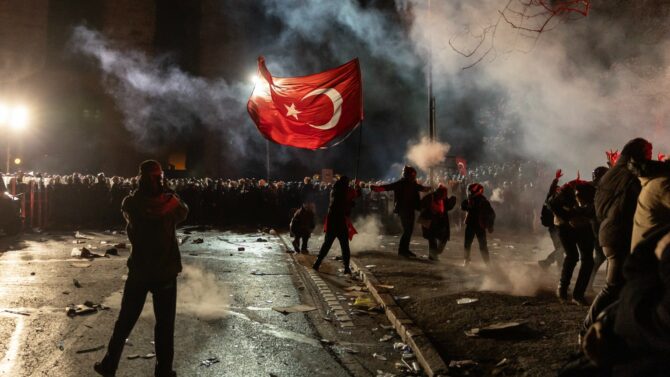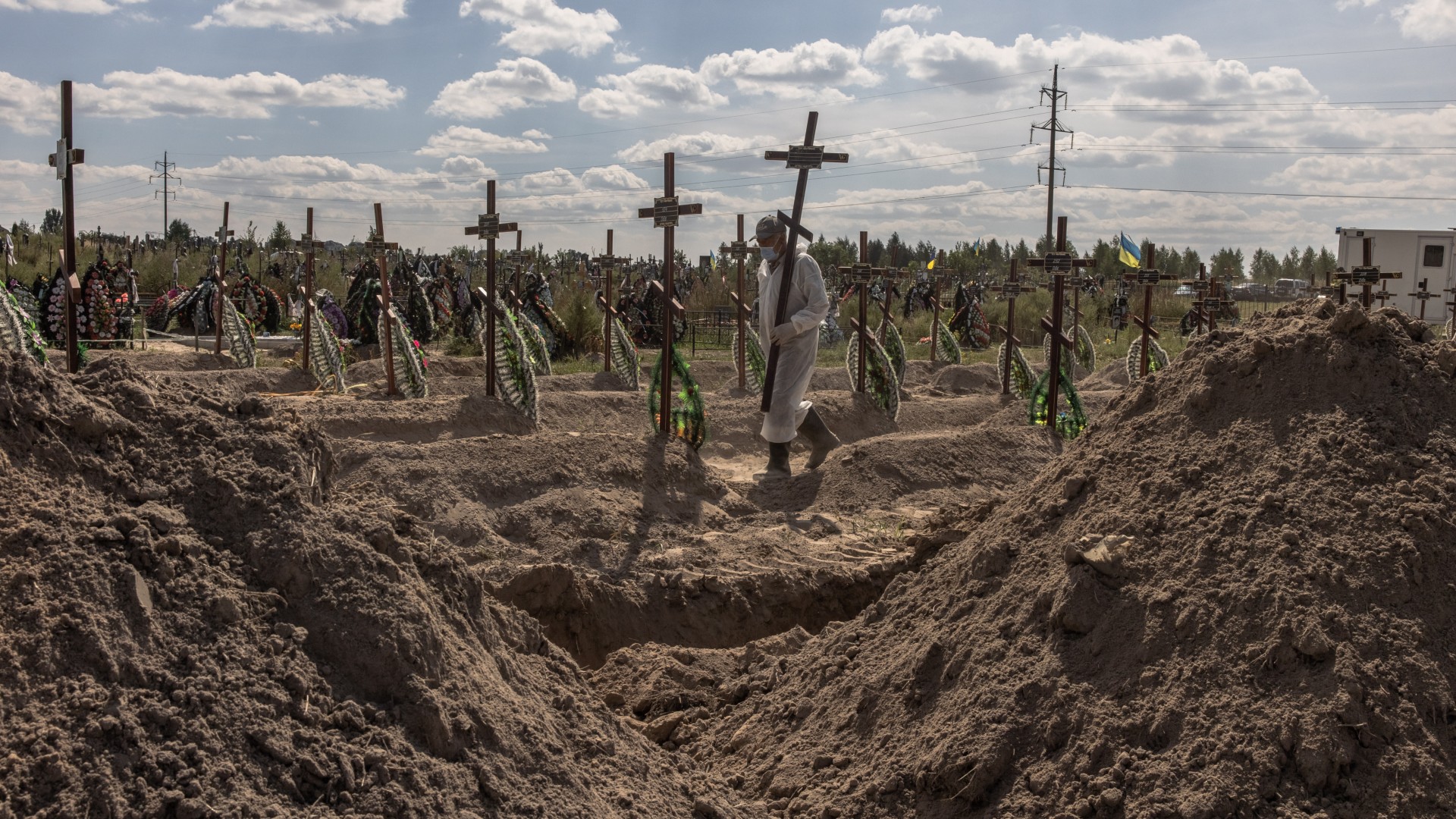The story of exiled Russian journalist Katerina Fomina, who was sentenced by a Moscow court to 8.5 years in prison for “spreading fake news.” She had investigated possible war crimes committed by the Russian army in Ukraine.
On March 31, 2025, Russian journalist Katerina Fomina was on the phone with an old friend when she suddenly began receiving messages. They informed her that a court in Moscow had sentenced her to 8.5 years in prison. She was in shock.
Fomina left Russia a few weeks after the Russian invasion of Ukraine began in February 2022. Since then, she has been living in exile somewhere in Europe. For security reasons, she does not even publicly disclose the country she is in.
She was convicted in absentia by a Russian court on charges of “spreading false news.” In reality, the charges were related to her reporting, which exposed possible war crimes committed by the Russian army in the town of Bucha.
“Fortunately, I live in exile and won’t be sent straight to prison,” she told iMEdD during a call on the Signal app.
Photography Exhibition: “A Brief Guide to Investigating War Crimes”

What does it mean to document war crimes? What role does photography play in the pursuit of truth and justice? The photography exhibition A Brief Guide to Investigating War Crimes, presented by iMEdD in Thessaloniki, seeks to answer these questions through the work of Ron Haviv, one of the world’s most renowned war photographers.
The Flight From Russia
Fomina spent the first weeks of the Russian invasion documenting anti-war demonstrations in Moscow, but she soon realized it was futile. She left Russia in March 2022.
“It was obvious that the government would not allow journalists to continue their work. Those who stayed behind and spoke out against what was happening would be immediately arrested,” she told iMEdD, explaining why she and her colleagues decided to leave the country. “We were afraid the government would close the borders or block the internet, so we wouldn’t be able to do anything,” she added.
According to data from the Committee to Protect Journalists (CPJ), a New York-based international organization, 26 journalists have been imprisoned in Russia since February 24, 2022. Of these, eight were charged with spreading “fake news,” 14 were charged with terrorism or extremism, and in four cases, the reason for imprisonment has not been disclosed.
CPJ also notes that nine exiled journalists have been convicted in absentia, and that a total of 272 journalists and media outlets have been labeled “foreign agents” by Russian authorities. The organization does not have data on the exact number of Russian journalists living in exile. Other organizations estimate the number to be between 1,000 and 1,500, though this has not been officially confirmed.
Face To Face With the Prosecutor
Fomina knew that charges were pending against her. A year before her conviction, she had already been arrested while abroad and had appointed a lawyer to represent her at the trial in Moscow.
“I didn’t expect everything to happen so quickly,” she told iMEdD. Her conviction came after four court sessions. “There was actually no evidence against me. The decision had already been made. The judge just read it out. He didn’t decide anything,” she said.
Fomina’s report that led to her conviction concerned alleged war crimes committed by the Russian army in the town of Bucha, located in the greater Kyiv region. The town was under Russian occupation for almost a month in March 2022. When Russian forces withdrew, investigations by local authorities uncovered at least 458 dead, while the UN recorded at least 73 civilian executions. Fomina arrived in the area shortly after the withdrawal of the Russian troops. Her investigation led her to a mobile phone that had been left behind by Russian soldiers after they used it to call relatives back home. Using the call logs, she compiled a list of phone numbers and matched them to social media profiles. In this way, she was able to find out about eight Russian paratroopers who had been part of the occupation and were suspected of involvement in possible war crimes.

“My investigation was meant as an invitation to the Russian Prosecutor’s Office to investigate the case further. Instead, they chose to investigate my work,” she told iMEdD. The report was published on the website iStories, which specializes in investigative journalism.
In early April, the investigative network OCCRP published a video of Fomina speaking on the phone with the key prosecution witness in her trial. The video was originally published on the Russian channel TV RAIN. The journalist did not disclose her identity at first. “Does the name Katerina Fomina sound familiar?” she asks him in Russian. “No,” the man replies. “I just wanted to let you know that she got 8.5 years in prison,” Fomina continues. “They spread slander about the army. They were talking about Bucha. They lied; they said that our guys killed civilians. They got what they deserved. Our enemies must be punished.” the man finally says.
Fomina later reveals that she herself is the person convicted. She claims the man is a pro-regime activist and a supporter of Putin’s government.
“I wanted to talk to him face to face. This is a man the same age as my parents. I wanted to ask him, ‘What’s going on in your mind?'” she recalls, just a few days after the call.
This is not Fomina’s only legal ordeal. A second case is pending against her, this time for reporting on alleged war crimes by the Russian army in the village of Andriivka, also in the Kyiv region. That trial has not yet begun.
“My Sister Asks Me Every Day if I Am Okay” — The Persecution of Journalists in Turkey

From the outset of the crisis—triggered by the arrest of Ekrem İmamoğlu—journalists have been targeted, and authorities have imposed restrictions on social media. What does the future hold for Turkey?
Life in Exile
Fomina’s journalistic journey began when she was still a teenager, writing for local newspapers and covering social issues. Over the years, she worked for various media outlets, including Novaya Gazeta, known for its in-depth investigations and reporting on corruption and human rights violations in Russia. Now 32, she says life in exile comes with many challenges.
“I used to travel, talk to people, and build rapport and trust with my sources. Now, most of my sources are in Russia, and I rely on web applications to communicate with them,” she told iMEdD. “Someone can go to jail for five years just for talking to me,” she added, explaining why she follows strict security protocols to protect her sources and collaborators.
But it’s not just about protecting her sources—Fomina is also extremely cautious about her own safety, despite having lived outside Russia for more than three years. She referred to the case of Christo Grozev, the Bulgarian journalist and Kremlin critic, who, as revealed in a London court, had been tracked for years and was the target of a planned assassination by a group of Russian spies.
“I don’t share my address or personal details with new friends or colleagues, and I never post real-time photos online,” Fomina said. “You get into the habit of not eating at unknown places, checking a hotel room carefully before booking it. There have even been poisoning attempts of colleagues at international conferences.”
Watch below Katerina Fomina’s speech at the iMEdD International Journalism Forum 2022, in the panel entitled “Freedom, Independence and Sustainability of the Press”:
Cover image: A worker carries a cross during a burial ceremony for unidentified persons killed in the Bucha district at the time of the Russian occupation, at a cemetery in Bucha, northwest of Kyiv (Kiev), Ukraine, 02 September 2022. EPA/ROMAN PILIPEY

